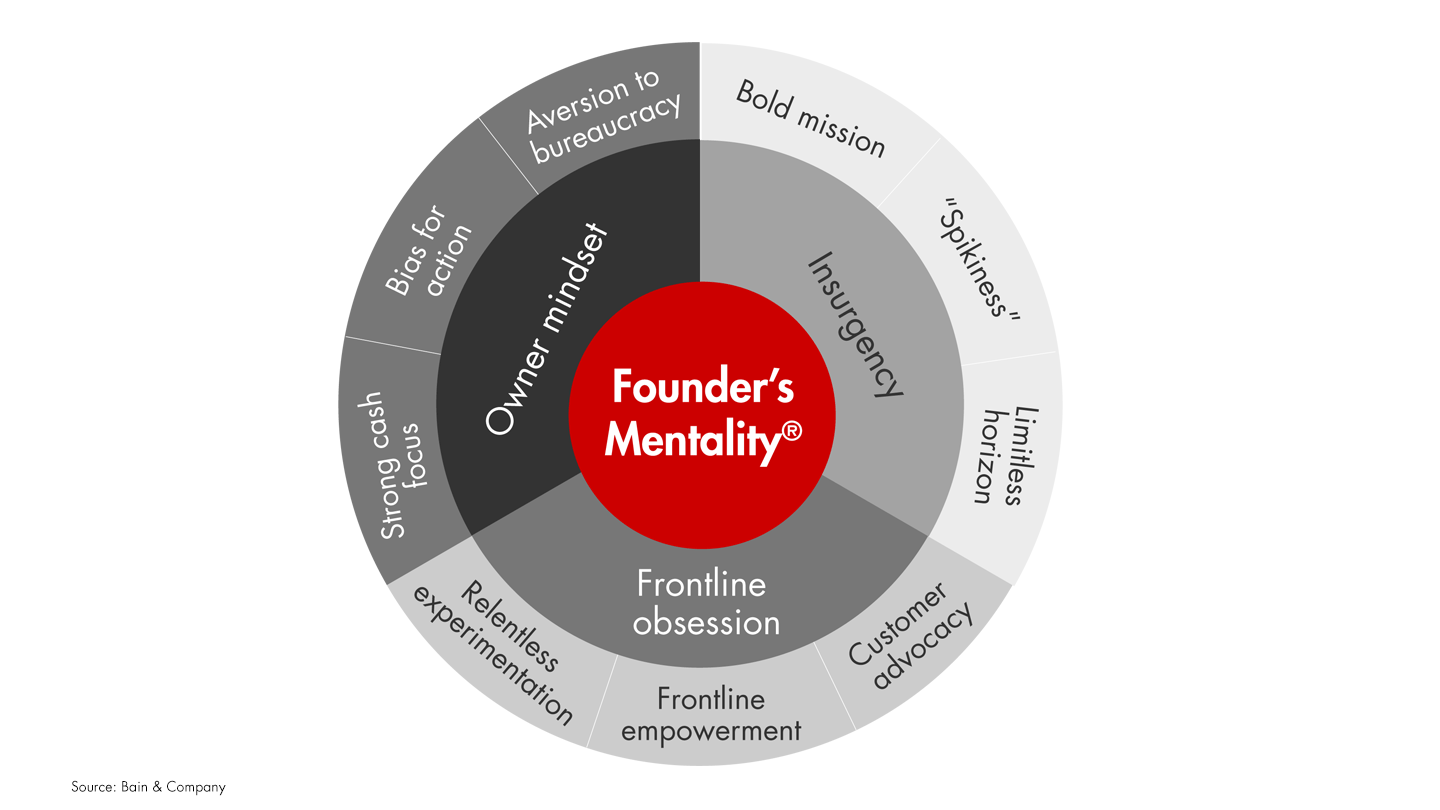Founder's Mentality Blog
Incumbent companies tend to lose faith over time in cost control. Instead of lowering sales, general and administrative (SG&A) costs as a percentage of sales, for instance, they are content to allow them to grow at the rate of sales growth. They ignore the value of continuously reducing costs and passing the benefit along to customers.
This doesn’t happen at companies with high Founder’s Mentality—companies we define as having an extraordinary sense of insurgency, a frontline obsession and an owner mindset, each of which have their own sub-elements (see Figure 1). The last of these elements, owner mindset, provides some of the most important antibodies to complexity, creating a culture that ruthlessly cuts costs and complexity and rewards those who act to overcome and destroy bureaucracy whenever it rears its head.


An owner mindset includes three elements:
- A strong cash focus: Leaders are obsessed with the cash generated by the business, which demands they constantly monitor the gross margin of the business and the SG&A line. They constantly reallocate spending to the best use, never allowing resources to be hoarded.
- A bias for action and speed. Leaders of insurgent companies welcome conflict—if quickly resolved—as a path to the best outcomes for the company and its customers. But they won’t tolerate anyone using conflict as an excuse for inaction or to slow the company’s metabolism.
- An aversion to bureaucracy: While systems, processes and procedures become increasingly necessary as a company grows, insurgent leaders seek to balance that need for professionalization by making heroes of those individuals who don’t hesitate to buck the systems if it means doing the right thing for the customer. Leaders accept the occasional chaos that may result as the cost of maintaining that balance.

About the Founder's Mentality
The three elements of the Founder's Mentality help companies sustain performance while avoiding the inevitable crises of growth.
Let’s take a closer look at the role a strong cash focus plays at insurgent companies. Leaders of these companies are obsessed with cash, but more precisely with their business’s nanoeconomics (a term I’m applying to the basics of business: the realized price vs. costs). They focus on unit volume growth, recognizing that this kickstarts operating efficiencies. They push for continual cost improvement—for them, this is the primary benefit of achieving greater scale and produces more money that they can reinvest in the business. The decision to reinvest in the business (instead of paying off the existing creditors and investors who are always waiting at the door) is a massive decision to invest in the future capabilities of the firm. It is a bet on growth. They do so by “zero-basing” and then reallocating the funds they liberate to those areas where it will produce the greatest return. They don’t allow resources to become trapped in siloes. We describe this is as using SG&A as capability currency. When leaders of insurgents invest money in the SG&A line of their companies, it is a massive symbol: with each dollar they are investing in future capabilities to create new areas of future growth.
We’ve collected dozens of examples of this cash focus during our Founder’s Mentality 100 (FM100) meetings. Here’s a sampling:
- From an engineering company: “My grandfather['s] obsession [was] with our pricing strategy for each engineering proposal. He had so many simple rules. We had to make a minimum margin on each proposal, unless we were entering a new line of business and we knew more deals would follow. We had to work with partners and suppliers that offered not the best price, but a fair price—it was equally important that they were reliable. He’d rather have a slightly higher-cost bid that he knew he could deliver than to always be low-cost with sleepless nights about whether he and his partners could pull it off. He told me, ‘You can delegate a lot of things, but never profit margins. Control the order book and sign off on final pricing.’ And I still do!”
- From an auto-parts supplier: “I know market share is important, but it is not the most important thing. Focusing on growth and market share can make you do foolish and unprofitable things. What I really care about is the quality of our order book. When one of our divisions signs a deal with an auto supplier, I ask, ‘Was it a good contract? Are we going to make some money on that deal?’ Because what is the good of revenue growth if it is the sum of dumb contracts that lose me money? What is the point of market share if it is a big share of an unprofitable market? What I care about is whether or not we are signing a good deal, with healthy margins.”
These leaders are worried about what Michael Dell called “profitless prosperity,” which we cited in our book Beyond the Core. He was referring to the danger of companies pursuing a whole series of profitless adjacency moves in which each investment adds revenue, but no profit.
This is the danger of losing the strong cash focus that defines a company’s early years. Nanoeconomic decisions become disconnected. Revenue growth is managed without understanding whether basic gross margins or cash generation targets are achieved. Costs are managed independently of volume growth (which should trigger most major improvements in costs). In short, the leadership team stops looking at the order book. Yet, at its most fundamental level, the entire future of the business depends on the story it tells.

Beyond the Core
Learn more about how how powerful, repeatable methods for moving into new adjacencies can dramatically increase the odds of success.